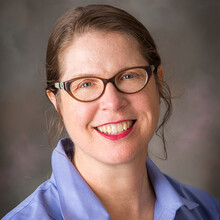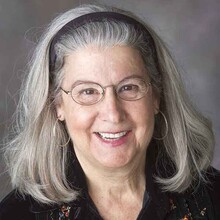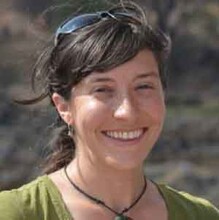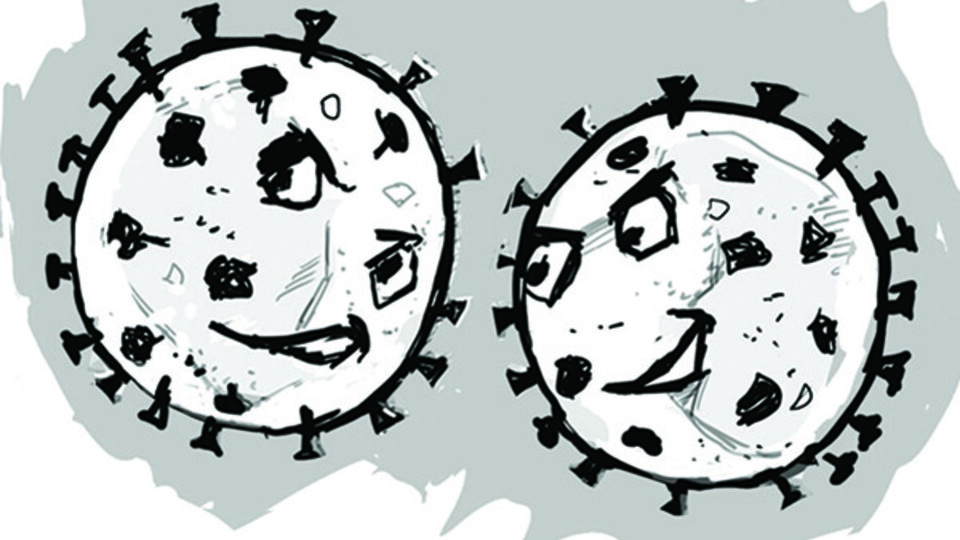Dan Moser, December 17, 2021
Project seeks artists’ submissions encouraging COVID vaccination
A new effort to help reduce vaccine hesitancy is building on previous projects that use art to convey information in an enjoyable, entertaining way that humanizes the experience of pandemics and vaccines.

Julia McQuillan
A University of Nebraska team is seeking submissions from artists — all ages, professional, amateur, even newbies — that promote COVID-19 vaccines and reduce vaccine hesitancy. The selected works will be on display at the State Capitol from April 18-29, 2022, posted online, promoted through social media channels and eventually made available in a book.
The project supplements the broader Worlds of Connections project, a Husker-led Science Education Partnership Award supported by the National Institutes of Health.
“Science communication can be tricky. People can feel like you’re bossing them around. It can be pedantic,” said Julia McQuillan, sociologist and leader of Worlds of Connections. “Many of us are tired of repeated directions about what to do. Our goal is to provide innovative and creative ways to convey how we can best support each other through this frightening time.”

Judy Diamond
The project builds on a 2020 National Science Foundation RAPID Grant award to Judy Diamond, curator at the University of Nebraska State Museum and professor of University Libraries, that resulted in “C’rona Comix,” a series of one-page comics. Through a partnership with Bob Hall, longtime artist, writer and Nebraska alumnus; Husker scientist Liz VanWormer; Judi gaiashkibos, director of the Nebraska Commission on Indian Affairs; and others, “C’rona Comix” sought to convey accurate science about the coronavirus to young people.
“We felt we could build on our prior art and science work to do a different kind of project related to vaccines and vaccine hesitancy,” Diamond said.
The project’s team includes scientists and artists from both the University of Nebraska–Lincoln and University of Nebraska Medical Center.

Liz VanWormer
“Some of our team looks through the lens of science, and others look at it through the lens of art,” Diamond said. “This is quite a remarkable project that draws on many different viewpoints … to try to put forward a rather powerful statement about the importance of vaccines.”
Diamond said using art to communicate science is nothing new.
“Many scientists, for a very long time, have identified art as a terrific vehicle for getting across scientific ideas, partly because art conveys the emotional impact of ideas rather than just words,” she said. “People’s relationship with information about the pandemic is very confused, wrapped up in issues of who to trust and how to protect one’s self and one’s family.
“We’re looking for inroads into how to communicate science in an accessible way that isn’t going to answer everybody’s questions but gives food for thought through gentle prodding.”
McQuillan, Willa Cather Professor of sociology, said art also can be effective in communicating information to lower-literacy audiences. She encouraged anyone with an idea to submit artwork, including teachers who want to make it a class project. A review team will assess the submitted art, with $600 to be awarded to each artist whose work is selected. Priority consideration will be given to art submitted by Jan. 10.
“We’re looking for art from a really wide array of people that will resonate with different communities,” said VanWormer, a veterinary epidemiologist in the School of Natural Resources and coordinator of One Health Nebraska.
The work is funded by a supplemental $50,000 grant from NIH’s National Institute of General Medical Sciences and builds on the $1.2 million Worlds of Connections project, which seeks to:
- Enhance the diversity of the biobehavioral and biomedical workforce by increasing interest in network science among members of underrepresented minority communities, and
- Promote public understanding of the benefits of NIH-funded research for public health.






